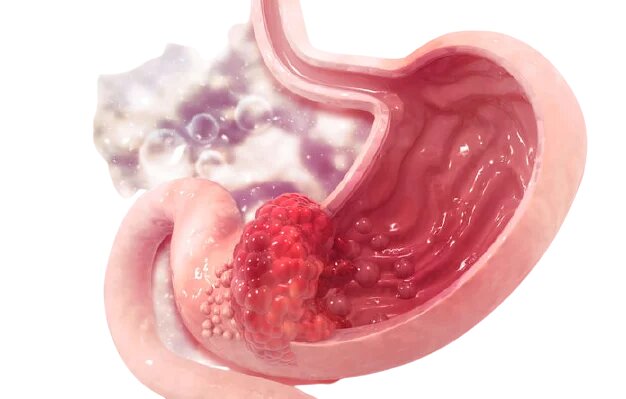Stomach cancer
Signs and Symptoms of Stomach Cancer
 Early-stage stomach cancer rarely causes symptoms. This is one of the reasons why stomach cancer is so difficult to detect early. Signs and symptoms of stomach cancer may include:
Early-stage stomach cancer rarely causes symptoms. This is one of the reasons why stomach cancer is so difficult to detect early. Signs and symptoms of stomach cancer may include:
Little appetite.
Weight loss (without trying).
Abdominal (belly) pain.
Vague discomfort in the abdomen, usually above the navel.
A feeling of fullness in the upper abdomen after eating a small meal.
Heartburn or indigestion.
Nausea.
Vomiting, with or without blood.
Swelling or accumulation of fluid in the abdomen.
Blood in the stool.
Low number of red blood cells (anemia).
Most of these symptoms are more likely to be caused by things other than cancer, such as a stomach virus or an ulcer. They can also occur with other types of cancer. But people who have any of these problems, especially if they don't go away or get worse, should see their doctor so the cause can be found and treated.
Because symptoms of stomach cancer often do not appear until the disease is advanced, only about 1 in 5 stomach cancers in the United States are detected at an early stage, before it does not spread to other areas of the body.
When to see a doctor?
If you have signs and symptoms that worry you, make an appointment with your doctor. Your doctor will likely look at the most common causes of these signs and symptoms first.
The causes of stomach cancer
It is not known what causes stomach cancer, although research has identified many factors that may increase the risk.
Doctors know that stomach cancer begins when a stomach cell develops changes in its DNA. A cell's DNA contains the instructions that tell the cell what to do. The changes tell the cell to grow rapidly and continue to live when healthy cells die. The cells that accumulate form a tumor that can invade and destroy healthy tissue. Over time, cells can rupture and spread (metastasize) to other areas of the body.
Risk factors
Factors that increase the risk of stomach cancer include:
Gastroesophageal reflux disease.
Obesity.
A diet rich in salty and smoked foods.
A diet low in fruits and vegetables.
Family history of stomach cancer.
Helicobacter pylori infection.
Long-term stomach inflammation (gastritis).
Smoker.
Stomach polyps.
Prevention
To reduce the risk of stomach cancer, you can:
Maintain a healthy weight. If you are overweight or obese, discuss with your doctor about strategies to help you lose weight. Aim for slow, steady weight loss of 1 or 2 pounds per week.
Choose a diet rich in fruits and vegetables. Try to incorporate more of fruits and vegetables to your diet each day. Choose a wide variety of colorful fruits and vegetables.
Reduce the amount of salty and smoked foods you eat. Protect your stomach by limiting these foods.
Quit smoking. If you smoke, quit. If you don't smoke, don't start. Smoking increases your risk of stomach cancer, as well as many other types of cancer. Quitting smoking can be very difficult, so ask your doctor for help.
Ask your doctor about your risk of stomach cancer. Discuss with your doctor if you are at increased risk of stomach cancer. People with a strong family history of stomach cancer might consider tests, such as endoscopy, to look for signs of stomach cancer.
Treatments for stomach cancer
The only curative treatment for stomach cancer is surgery: A gastrectomy can be performed by laparotomy or by laparoscopy after a complete exploration of the abdominal cavity. The distal section always involves the duodenum after the pylorus. The proximal section, at a variable level, leaving a more or less important gastric stump in place.
In the event of a total gastrectomy, the proximal section bears on the cardia. Partial gastrectomy is possible in the event of distal cancer.
After removing all or part of the stomach, the continuity of the digestive tract must be restored. The connection can be made between the residual stomach and the duodenal section. This is the so-called Péan technique.
It can also take place between the stomach and the small intestine by closing the duodenal stump. This is the Finsterer technique.